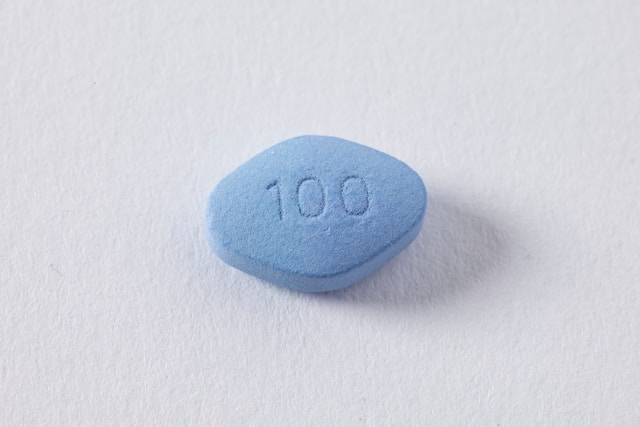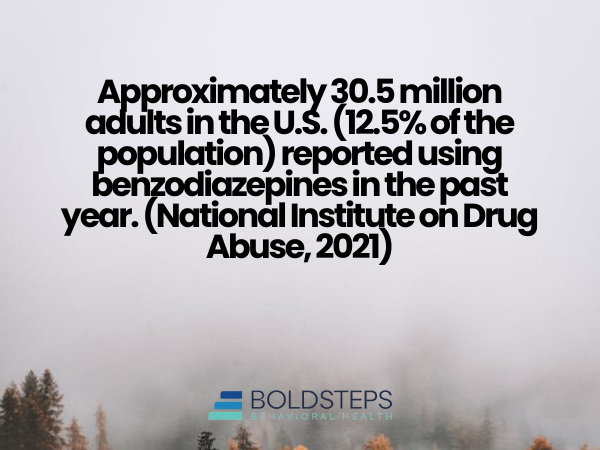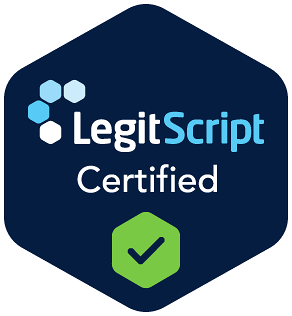Benzodiazepines, commonly prescribed for anxiety, insomnia, and seizures, are some of the most frequently used medications in the United States. While effective when used as directed for short periods, these drugs can quickly lead to physical dependence and addiction when misused or taken for extended durations. Detoxing from benzodiazepines is a critical first step toward recovery, but it is a process that requires professional medical supervision due to the complexity and risks associated with withdrawal.
At Bold Steps New Hampshire, we understand the challenges of benzodiazepine addiction and offer a range of services to support safe detox and long-term recovery. Through our Benzo Addiction Treatment Program, Medical Detox Program, and comprehensive recovery services like Dual Diagnosis Treatment Programs, we help individuals safely overcome benzodiazepine dependency while building the tools they need for lasting sobriety.
The Reality of Benzodiazepine Dependence
Benzodiazepines, including medications like Xanax, Valium, Klonopin, and Ativan, work by enhancing the effect of gamma-aminobutyric acid (GABA), a neurotransmitter responsible for calming the nervous system. Over time, the brain adapts to the drug, reducing its natural production of GABA. This adaptation results in physical dependence, where stopping or reducing the medication can lead to withdrawal symptoms, and psychological dependence, where individuals feel they need the drug to function.
How Benzodiazepine Dependence Develops
- Tolerance: Over time, individuals require higher doses to achieve the same calming effects.
- Dependence: The body begins to rely on the drug to maintain normal functioning.
- Addiction: Misuse, such as taking higher doses than prescribed or using without a prescription, leads to compulsive drug-seeking behavior despite negative consequences.
Signs of Benzodiazepine Addiction
- Needing more of the medication to achieve the same effect (tolerance).
- Experiencing withdrawal symptoms like anxiety, irritability, or insomnia when the drug is not available.
- Using the medication outside of prescribed guidelines or obtaining it illegally.
- Struggling to stop using benzodiazepines despite wanting to quit.
- Neglecting personal, professional, or social responsibilities due to drug use.
Why Safe Detox is Essential for Benzodiazepine Recovery
Unlike many other drugs, detoxing from benzodiazepines without medical supervision can be extremely dangerous. Withdrawal symptoms can range from mild to life-threatening, with some individuals experiencing seizures, hallucinations, or severe psychological distress. Safe detox involves a medically supervised environment where withdrawal symptoms are managed, and the individual’s health is carefully monitored.
Risks of Benzodiazepine Withdrawal
- Physical Symptoms: Sweating, nausea, muscle pain, and headaches are common.
- Psychological Symptoms: Severe anxiety, panic attacks, depression, and irritability often occur.
- Seizures: Sudden withdrawal can trigger seizures, which can be life-threatening.
- Delirium Tremens (DTs): In severe cases, individuals may experience confusion, agitation, and hallucinations.
Detoxing under the care of a Medical Detox Program significantly reduces these risks and ensures the process is as safe and comfortable as possible.
What to Expect in a Safe Benzodiazepine Detox Program
At Bold Steps Behavioral Health, we provide a structured, medically supervised environment to ensure that detox is safe and effective. Here’s what you can expect when you begin your journey to recovery:
1. Initial Assessment and Personalized Plan
The detox process starts with a comprehensive evaluation to understand the individual’s physical, emotional, and psychological health. During this assessment:
- Medical History: We evaluate your history of benzodiazepine use, any co-occurring substance use, and medical conditions.
- Mental Health Screening: Conditions like anxiety, depression, or PTSD are identified and integrated into the treatment plan through our Dual Diagnosis Treatment Program.
- Customized Plan: A personalized detox plan is developed based on your level of dependency, medical needs, and recovery goals.
2. Gradual Tapering Approach
Abruptly stopping benzodiazepines can cause severe withdrawal symptoms, so we use a gradual tapering method to ensure safety. This process involves:
- Dose Reduction: Slowly reducing the amount of benzodiazepines taken over time to minimize withdrawal symptoms.
- Individualized Schedule: Tapering timelines vary based on the individual’s history and response to detox.
- Medication Management: Alternative medications may be used to manage anxiety, sleep disturbances, or other symptoms during the taper.
3. 24/7 Medical Supervision
During detox, individuals are monitored around the clock by medical professionals. This supervision ensures:
- Immediate Intervention: In the event of severe symptoms, such as seizures or hallucinations, medical staff can provide life-saving care.
- Symptom Management: Medications and other interventions are used to keep withdrawal symptoms manageable.
- Emotional Support: Counselors and medical staff provide reassurance and guidance throughout the detox process.
4. Symptom Management and Comfort
Withdrawal symptoms can be uncomfortable, but our team focuses on making the process as smooth as possible. Strategies include:
- Non-Addictive Medications: To manage anxiety, promote sleep, and alleviate nausea or muscle pain.
- Holistic Therapies: Techniques like yoga, mindfulness, and meditation can help reduce stress and improve relaxation.
- Nutritional Support: A healthy diet and hydration promote physical healing and strengthen the body during detox.
5. Transition to Comprehensive Recovery Programs
Detox is only the first step in the recovery process. Once individuals complete detox, they transition into a structured treatment program to address the psychological and behavioral aspects of addiction.
Partial Hospitalization Program (PHP)
- Offers intensive, structured therapy during the day, including individual counseling, group therapy, and skills-building sessions.
- Provides medical oversight and support for individuals who require a higher level of care.
Intensive Outpatient Programs (IOP)
- Allows individuals to attend therapy multiple times a week while balancing work, school, or family obligations.
- Focuses on relapse prevention, emotional regulation, and long-term recovery planning.
Outpatient Treatment Program
- Provides continued support through regular therapy sessions.
- Ideal for individuals transitioning from higher levels of care to independent recovery.
Virtual Treatment Program
- Offers online access to therapy and counseling for those unable to attend in person.
- Ensures that care remains accessible and flexible.
Addressing Co-Occurring Disorders with Dual Diagnosis Treatment
Many individuals with benzodiazepine addiction struggle with underlying mental health conditions, such as anxiety, depression, or PTSD. Ignoring these co-occurring disorders can increase the risk of relapse. Our Dual Diagnosis Treatment Program integrates mental health care with addiction treatment, ensuring a comprehensive approach.
Key Components of Dual Diagnosis Treatment
- Cognitive Behavioral Therapy (CBT): Helps individuals identify and change negative thought patterns and behaviors.
- Dialectical Behavior Therapy (DBT): Focuses on emotional regulation and coping strategies for managing stress.
- Trauma-Informed Care: Addresses unresolved trauma that may contribute to substance use.
- Medication Management: Treats mental health symptoms safely without relying on addictive medications.
The Role of Behavioral Health in Recovery
Long-term recovery requires more than detox—it involves addressing the emotional, social, and behavioral aspects of addiction. At Bold Steps Behavioral Health, we provide comprehensive Behavioral Health Treatment in New Hampshire, which includes:
- Individual Therapy: Helps individuals explore the root causes of addiction and set personal recovery goals.
- Group Therapy: Builds a supportive community of peers with shared experiences.
- Family Therapy: Strengthens relationships and improves communication within families affected by addiction.
- Holistic Approaches: Incorporates mindfulness, physical activity, and stress reduction techniques to promote overall wellness.
Why Choose Bold Steps Behavioral Health?
At Bold Steps Behavioral Health, we are committed to providing compassionate, evidence-based care for individuals struggling with benzodiazepine addiction. Here’s what sets us apart:
1. Comprehensive Care
We offer a full continuum of care, from detox to outpatient services, ensuring seamless transitions between treatment stages.
2. Individualized Treatment Plans
Every individual’s recovery journey is unique. We tailor our programs to meet specific needs and goals.
3. Expert Staff
Our team includes licensed therapists, addiction specialists, and medical professionals with extensive experience in treating benzodiazepine addiction.
4. Holistic Healing
We address the mind, body, and spirit to promote lasting recovery and overall well-being.
5. Accessibility
With in-person and virtual programs, we make high-quality care accessible to everyone, regardless of location.
Conclusion
Detoxing from benzodiazepines is a challenging but essential step toward recovery. With professional medical supervision and comprehensive care, individuals can safely navigate the withdrawal process and build a foundation for long-term sobriety. At Bold Steps Behavioral Health, we provide the tools, support, and expertise needed to help individuals overcome addiction and reclaim their lives.
Take the first step today. Call us at (603) 915-4223 or visit Bold Steps Behavioral Health to learn more about our Benzo Addiction Treatment Program, Medical Detox Program, and other recovery services. Together, we can help you achieve lasting freedom from benzodiazepine addiction.
FAQ on Safe Detox for Benzodiazepines
What is benzodiazepine addiction?
Benzodiazepine addiction occurs when individuals misuse benzodiazepines like Xanax, Valium, or Klonopin, leading to physical dependence and compulsive drug use despite negative consequences.
Why is detoxing from benzodiazepines dangerous without medical supervision?
Abruptly stopping benzodiazepines can cause severe withdrawal symptoms, including seizures, hallucinations, and delirium tremens (DTs). A Medical Detox Program ensures safety by providing medical supervision and symptom management.
What are the symptoms of benzodiazepine withdrawal?
Common withdrawal symptoms include:
- Anxiety and panic attacks
- Insomnia
- Irritability and mood swings
- Muscle pain and tension
- Seizures (in severe cases)
What is a Medical Detox Program?
A Medical Detox Program provides 24/7 medical monitoring, symptom management, and gradual tapering of benzodiazepine doses to ensure a safe and comfortable withdrawal process.
What is the tapering method in detox?
The tapering method involves gradually reducing benzodiazepine doses over time to minimize withdrawal symptoms and reduce health risks. It is the safest way to detox from benzodiazepines.
What is Dual Diagnosis Treatment?
Dual Diagnosis Treatment addresses co-occurring mental health disorders, such as anxiety or depression, alongside addiction. Treating both conditions simultaneously reduces the risk of relapse.



